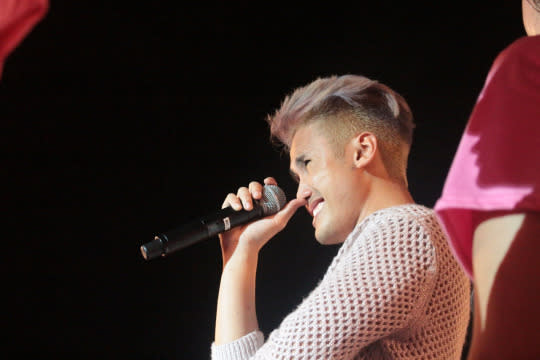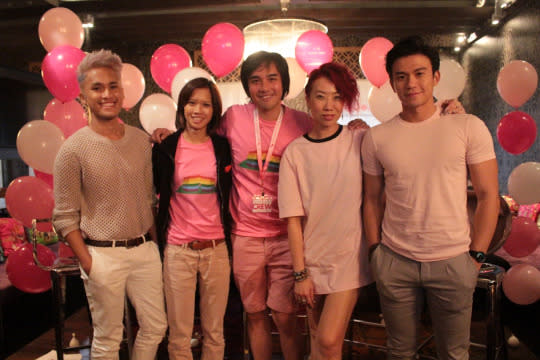What next after Pink Dot?

A Pink Dot flag-bearer observes the National Anthem at the annual event at Hong Lim Park on 13 June 2015 (Photo: Regina Goh)
As the dust of annual lesbian, gay, bisexual and transgender (LGBT) awareness event Pink Dot settles from an estimated 28,000-strong turnout on Saturday, 13 June 2015, the LGBT community is taking concrete steps forward to engage more people from the varied facets of Singapore’s societal and political landscape.
Pink Dot appointed, this year, its first ever Malay ambassadors in its seven-year run – YouTube personalities Maimunah Bagharib and Hirzi Zulkiflie.

Pink Dot ambassador Hirzi Zulkifli in tears as he reads out his speech before the crowd at the recent Pink Dot event (Photo: Regina Goh)
In a show of emotion, Hirzi broke down into tears at multiple points in his speech before the Pink Dot crowd.
He said that the reason he and Maimunah decided to be ambassadors for the event this year was in response to his fans “showing signs of helplessness” after a recent meet-and-greet revealed their fears as LGBT youth.
“We cannot continue to pretend that LGBT individuals do not exist within our community just because we shut them out from our conversations,” said Hirzi, in response to youth telling him that they were depressed from a lack of avenues to address their concerns.
Hirzi gave the example of a young hijab-wearing girl who was worried about coming out as a lesbian – he hopes that his appointment as Pink Dot’s ambassador will set about a course of change in acceptance by the Malay/Muslim community.
“I really do hope that while we are the first brown ambassadors, that we are not the last either. We all have different ideas of what is right and what is wrong but we should all have the same senses for what is human,” said Hirzi.
Pink Dot efforts more than one-time event: organisers

Pink Dot spokesperson Paerin Choa (centre) with the event’s ambassadors for 2015 (Photo: Regina Goh)
Pink Dot spokesperson Paerin Choa noted that there had been advances in the treatment of the LGBT community, there have been several setbacks in the last year.
In a press conference, Choa said that a 35-second advertisement for this year’s Pink Dot that was planned to be run in cinemas was banned from theatres by the Media Development Authority (MDA).
The MDA had said that “it is not in the public interest to allow cinema halls to carry advertising on LGBT issues, whether they are advocating for the cause, or against the cause”, Choa shared.
However, Choa says steps are being taken to further societal inclusivity for LGBT people in Singapore. Although he declined to reveal specifics, he cited examples where certain Singapore government agencies had approached Pink Dot for opinions regarding LGBT issues.
Choa also noted the increasing corporate support surrounding the event. A record nine corporate sponsors came on board this year, including media heavyweights Twitter and Bloomberg. Local movie giant Cathay Organisation also became a sponsor.
Add the newly-created Pink Street – a selection of retail outlets along North Canal Road, which lines one side of Hong Lim Park, that support the event – to this.
Movement forward: inter-varsity support group launched

Five LGBT groups from four varsities in Singapore have come together to launch an inter-university LGBT network in Singapore (Photo: Inter-University LGBT Network, Singapore/Facebook)
Further to this, groups in the ‘Inter-University LGBT Network’ (Inter-Uni), which consists of five LGBT-supporting groups from the National University of Singapore (NUS), Nanyang Technological University (NTU), Singapore Management University (SMU) and the Yale-NUS College, plan to meet regularly and share resources.
Among the initiatives Inter-Uni has launched is an orientation programme, consisting of an inter-university mixer organised by all five groups where participants would get to know prospective and current students, staff and alumni from the other varsities. Several groups will be hosting their own LGBT, friends and allies orientation programmes.
There are plans for some groups to collaborate and offer regular workshops such as Gender & Sexuality 101 and Allyship 101, as well as a forum on creating more inclusive school communities. The forum is slated to take place in the next semester.

